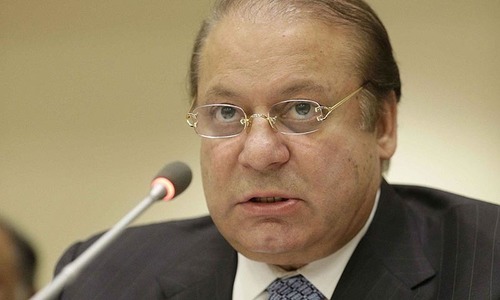ISLAMABAD: Pakistan and the International Monetary Fund (IMF) began talks on Sunday in connection with the 11th review of the $6.5 billion Extended Fund Facility (EFF), which would lead up to the finalisation of federal and provincial budgets for the financial year 2016-17.
Finance Secretary Dr Waqar Masood Khan is leading the delegation, which would be in Dubai for a five-day technical level discussion with the IMF mission.
Finance Minister Ishaq Dar, who is currently attending the Asian Development Bank’s annual meetings in Frankfurt, is expected to join policy-level negotiations with the Fund next weekend to resolve outstanding issues.
A government official said the government would share the latest macroeconomic indicators and their budget strategy paper for 2016-17 with the fund. Approved by the federal cabinet last week, the strategy envisages measures to achieve higher economic growth while consolidating stabilisation.
He said the government was comfortable with most of the structural benchmarks and performance indicators for end-March 2016, except for major setbacks to the privatisation agenda. This has been a major area of concern for the IMF, which has generally been appreciative of the government’s delivery on macroeconomic indicators and policy actions.
Official says govt needs to collect Rs760bn revenue in last two months of FY16 to achieve targets
“The various setbacks to the privatisation agenda are unfortunate,” IMF Pakistan mission chief Harald Finger had told journalists in early April, upon the formal completion of the 10th review and disbursement of $502 million.
The official said the tax collected by the Federal Board of Revenue in the first 10 months of the current fiscal year amounted to Rs2.345 trillion, showing 19pc growth. He added that the tax machinery would need to put together another Rs760 billion in the remaining two months of the fiscal year to achieve their Rs3.104 trillion target.
Power sector performance indicators — such as recoveries and losses — were broadly up to the mark and the passage of a law enabling the divestment of Pakistan International Airlines, a key condition, has now been met.
An expected shortfall in revenue because of problems with the auction of another telecom licence would be offset through lower-than-projected development expenditures, while natural gas tariff would be raised with effect from July 1.
The government will also share with the IMF its plans to reduce discriminatory statutory regulatory orders (SROs) to curtail tax exemptions. The Fund will be told that cutting the fiscal deficit to 3.8pc of the gross domestic product (GDP) — by increasing the revenue collection target to Rs3.735 trillion (a 20.3pc increase) — would remain the main focus of next year’s budget.
This would be accomplished through a combination of tax measures and improved tax administration. The government will also be looking to strengthen social safety nets and continue coming up with initiatives aimed at the youth, farmers and other marginalised sectors of the economy.
The development budget of the federal and provincial governments for FY2016-17 would be targeted at Rs1.497 trillion, and the economic growth target will be set at 6.2pc.
The government expects capacity additions in the gas and power sector, as well as additional investments under the China-Pakistan Economic Corridor (CPEC) along with an improved security environment, would help the country achieve the higher growth rate of 6.2pc by the end of next year. The federal public sector development programme (PSDP) may be increased by 14.3pc to Rs800 billion.
Similarly, the cumulative annual development plans of the four provinces would also go up to Rs696 billion next year from this year’s revised estimates of Rs600 billion, an increase of 16pc or almost Rs97 billion.
The key sectors for investment under this budget would be national security, rehabilitation of temporarily displaced persons, energy, communications, water and poverty reduction.
Total public sector investment (both federal and provincial) would involve an expenditure of Rs210 billion on energy and Rs470 billion on infrastructure, both federal expenditures. The social sector would consume about Rs545 billion, to be funded mostly by the provinces. All other sectors would attract investments of about Rs280 billion, from both the federal and provincial kitties.
Published in Dawn, May 2nd, 2016













































Dear visitor, the comments section is undergoing an overhaul and will return soon.